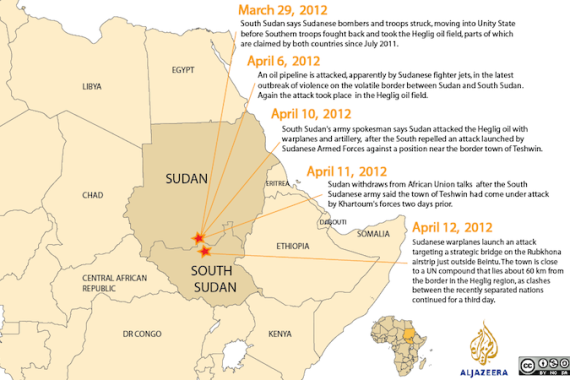UN demands rival Sudans end fighting
Security Council calls for end to clashes focused on contested oil field, as South Sudan sets out conditions for peace.

The United Nations Security Council has demanded an end to clashes between Sudan and South Sudan, calling on both countries to redeploy their forces 10 kilometres away from a border that they both recognised last year.
A statement from the 15-nation body on Thursday also insisted that Khartoum stop air strikes and Juba withdraw troops from the Heglig oil field.
“The recent violence threatens to return both countries to full-scale war and the period of tragic loss of life and suffering, destroyed infrastructure, and economic devastation, which they have worked so hard and long to overcome,” the statement from the Security Council said.
“The Security Council demands a complete, immediate, and unconditional: end to all fighting; withdrawal of [South Sudan’s army] from Heglig; end to [Sudanese armed forces] aerial bombardments; end to repeated incidents of cross-border violence between Sudan and South Sudan; and an end to support by both sides to proxies in the other country,” it said.
South Sudan sets conditions
Earlier, South Sudan set conditions to pull out troops from the contested oil field town of Heglig that it seized from Khartoum’s army this week, including a withdrawal by Sudan from Abyei, another disputed area.
“South Sudan would withdraw from Heglig if a guarantee can be provided that it will not be used for another attack against our territory,” Barnaba Marial Benjamin, the country’s information minister, said.
“Firstly, all ground and air assaults by Sudan must end immediately,” Benjamin said, three days after Southern troops wrested control of Heglig, amidst heavy clashes between the rival armies.
“The Sudan Armed Forces still occupying Abyei must also withdraw entirely,” he added, referring to the contested area seized by Khartoum’s forces last year.
Once that pullout is complete, “international monitors” would then have to ensure a demilitarised zone either side of the contested border until the frontier “can be demarcated under international arbitration”.
The UN Security Council in its statement on Thursday demanded that both sides withdraw their troops to 10km away from the 1956 borders to establish a demilitarised zone.
South Sudanese President Salva Kiir had earlier rebuffed UN calls to withdraw his country’s troops.
“[The UN Secretary General] gave me an order,” Kir said. “He said I order you to immediately withdraw from Heglig. I said I’m not under your command.”
Al Jazeera’s Nazanine Moshiri, reporting from Juba, the South Sudanese capital, said that South Sudan wanted an international mechanism in place before it withdraws from Heglig.
Sudanese warplanes attacked a major South Sudanese town at dawn on Thursday, bombing the capital of the oil-producing Unity border state, according to South Sudan officials.
The aircraft targeted a strategic bridge on the Rubkhona airstrip just outside Beintu town close to a UN compound, which lies about 60km from the frontier as clashes between the recently separated nations continued for a third day.
One soldier was killed and two others injured in the attack.
‘Choosing the path of war’
Sudanese President Omar al-Bashir accused South Sudan of “choosing the path of war,” following days of intensifying clashes on their shared border.
“Our brothers in South Sudan have chosen the path of war, implementing plans dictated by foreign parties who supported them during the civil war,” Bashir told reporters, referring to decades of conflict before the South’s independence last year.
| In Video |
|
Nazanine Moshiri reports from Juba in South Sudan |
“War is not in the interest of either South Sudan or Sudan but, unfortunately, our brothers in the South are thinking neither of the interests of Sudan or of South Sudan.”
Al Jazeera’s Harriet Martin, reporting from Khartoum, said that under international law Heglig belonged to Sudan.
“Interestingly, in the negotiations which have been taking place Addis Ababa, there are five disputed areas under discussion but Heglig is not one of them,” she said.
Daffa-Alla Elhag Ali Osman, Sudan’s ambassador to the UN, said he had filed a complaint to the Security Council condemning the “heinous attack” on Heglig.
“We will decide to retaliate, and retaliate severely, deep inside South Sudan if the Security Council doesn’t address the situation”, Ali Osman told reporters.
Heglig lies along the disputed border between the two African nations and has been the focal point of nearly two weeks of clashes between their armies, which have prompted the collapse of African Union-mediated talks.
The region is home to oil fields that account for about half of Sudan’s oil production, a critical source of income for the country’s flagging economy.
The two rivals fought a civil war that lasted decades, and never reached a deal to share the region’s oil resources or delineate their exact border during negotiations which led to South Sudan’s cessation last year.